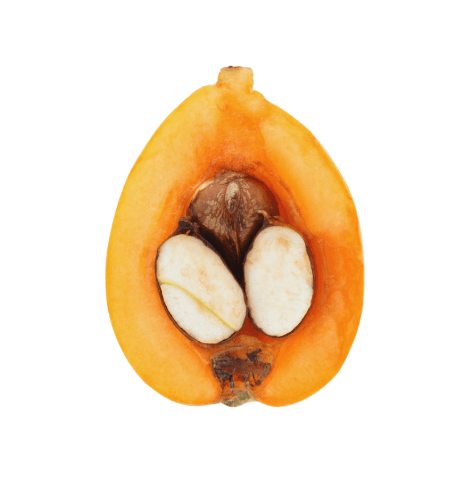Fruit Seeds
Fruit seeds can contain substances that are toxic and dangerous to pets, including cyanide compounds and risks of intestinal obstruction.

Fruit seeds can contain substances that are toxic and dangerous to pets, so they should never be eaten.In particular, apple seeds, peach pits, and cherry seeds contain a toxic compound called cyanogenic glycoside (cyanide). If ingested in large amounts, these seeds can lead to serious poisoning.
Additionally, for pets with sensitive digestion, swallowing seeds from fruits like watermelon or melon can cause indigestion or intestinal blockages. If a dog or cat swallows fruit seeds — especially large seeds like peach pits — they can become stuck in the digestive tract or irritate the stomach lining before they are digested. Large seeds can even travel to the intestines and cause blockages, leading to serious health complications.
*Always remove the seeds before giving fruits to your pets and only offer the fruit flesh itself.*
Cyanide Compounds
Cyanide is a toxic substance that interferes with the body’s ability to use oxygen. Once absorbed, it can cause breathing difficulties, confusion, irregular heartbeat, and even heart failure in severe cases.
Apple seeds, peach pits, cherry seeds, and certain other fruit seeds contain small amounts of cyanide. Ingesting a large quantity can result in serious poisoning and potentially life-threatening symptoms.
Indigestion (Digestive Upset)
Indigestion occurs when a dog’s digestive system is too weak to properly process food, causing food to remain in the stomach or be vomited back up.
It can happen for various reasons, including:
- Eating too much high-fat or high-protein food
- Pre-existing digestive diseases
- Side effects from medication
- Stress
Typical symptoms include vomiting, diarrhea, bloating, and loss of appetite.
Intestinal Obstruction
Intestinal obstruction occurs when the intestines are blocked or unable to pass waste normally. This may be suspected if your dog suddenly stops passing stool or if food and digestive fluids cannot move through the intestines.
Blockages are often caused by foreign objects, undigested materials, or large seeds getting stuck in the intestinal tract. Severe cases can require emergency surgery to remove the obstruction and prevent life-threatening complications.
Symptoms of Fruit Seed Ingestion
Symptoms can vary depending on the amount consumed, the size of the seeds, and the pet’s overall health. Common signs include:
- Vomiting
- Diarrhea
- Digestive discomfort or loss of appetite
- Intestinal blockage or inflammation of the digestive tract
What to Do If Your Pet Eats Fruit Seeds
If your pet shows any of the symptoms above after ingesting fruit seeds, contact a veterinarian as soon as possible. Even if the symptoms are mild, it’s still important to observe your pet closely and seek professional advice based on how much was eaten, how long ago ingestion occurred, and your pet’s size and overall health condition.
Prevention Tip: Always remove the seeds before giving fruits to your pet. Also, be mindful of the amount and type of fruit you offer to avoid digestive issues.
Treatment at the Animal Hospital
Veterinarians will provide appropriate treatment depending on the symptoms and severity after fruit seed ingestion.
- If the symptoms are mild, the vet may prescribe digestive aids or medications to help the body pass the seeds naturally or to protect the stomach lining and improve digestion.
- If the case is more severe — for example, if intestinal blockage or poisoning occurs — surgery or more intensive treatments may be necessary.
Final Summary
If your pet eats fruit seeds, never ignore the situation, even if symptoms appear mild at first. Seeds can cause serious internal damage or poisoning, especially if they are large or consumed in significant amounts. Quick action — including contacting your veterinarian immediately — significantly increases the chances of a full and safe recovery.